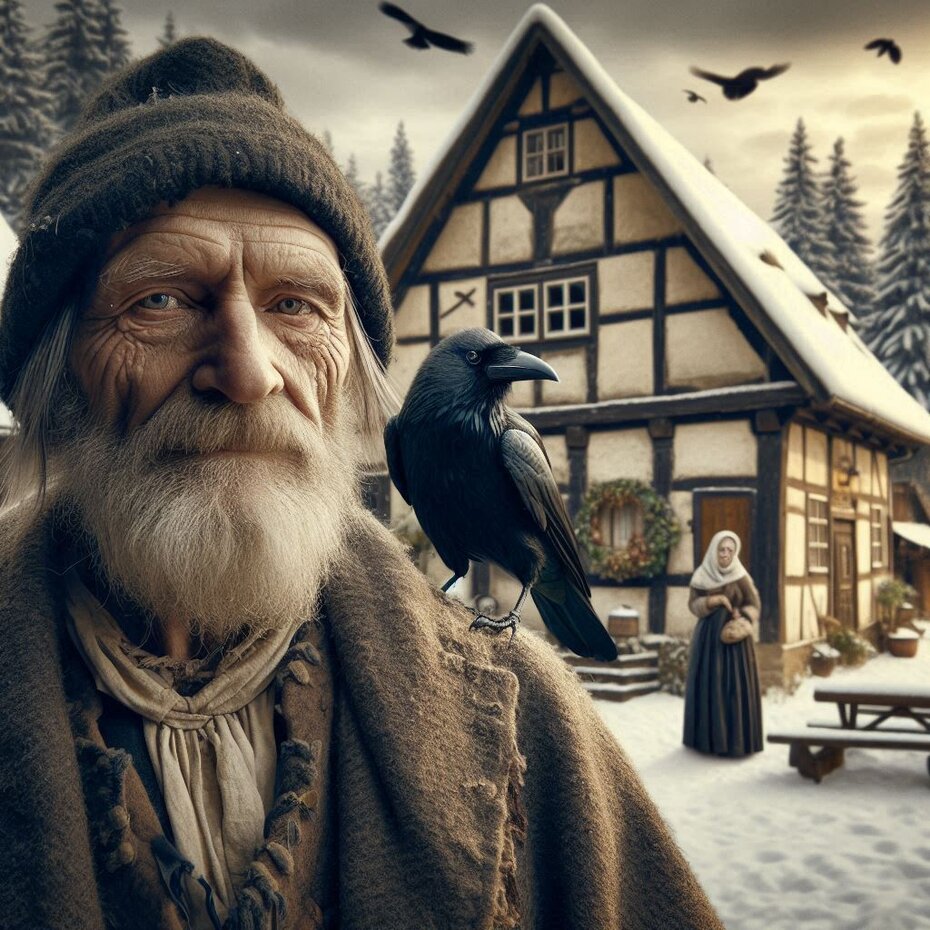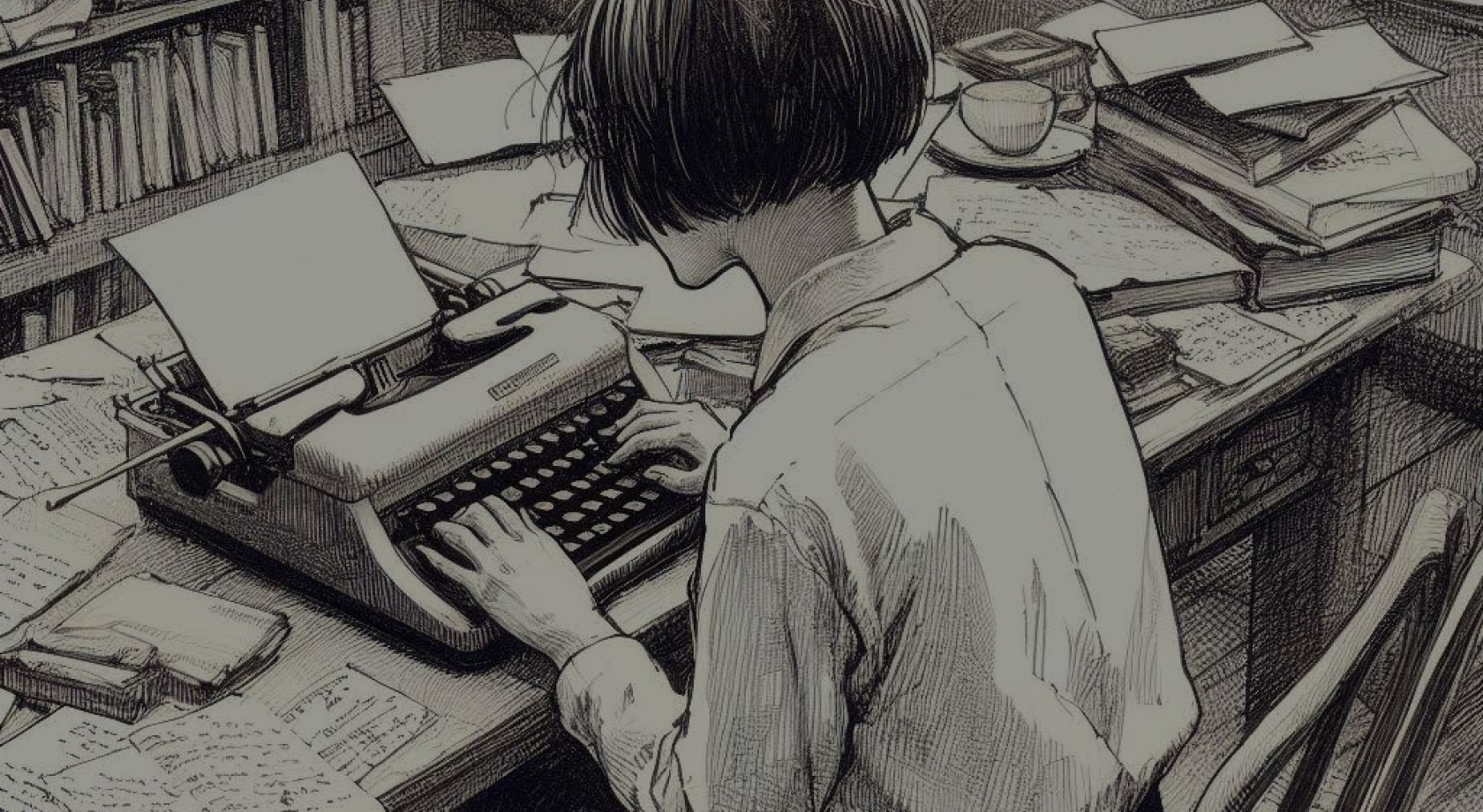Joachim and the crow (chapter 1)
A fable about the friendship between a man and a crow in northeastern Germany during the period of intense cold and famine that struck Europe in the 18th century.

It was the year of Our Lord 1770 and, even though the calendar announced the arrival of spring, the cold didn't seem to want to give way. It had been more than 30 years since Joaquim had seen such a harsh winter in these parts. The horizon was permanently gloomy, in shades of leaden gray. The blizzards that had kept the trees of the Hohenwald forest covered in a thick white layer for most of the winter still occurred occasionally. Without the usual noise of children playing in the street and women talking to their neighbors, the days were filled with a sepulchral silence: only the howling of wolves and the cawing of crows could be heard. This was getting on Joaquim's nerves, and he started drinking even more. Now, only a few glasses of schnapps could calm the anguish in his chest.
As the sun had hardly shone recently, the temperatures remained negative and the ground frozen, making it difficult to plow. As a result, food stocks had dwindled dangerously and the herds had begun to die off due to hunger.
Had it not been for the smoked fish, salted meat and pickled vegetables that Helena had prepared over the summer, she and her husband would have starved to death long ago. However, the preserved food was running out, and Joaquim would have to set off on long, solitary walks through the woods to collect roots, mushrooms and nuts to ensure their survival.
When he reached the valley of the forest, where the river used to run humming with its clear, fresh waters, he found only a layer of ice under which the water flowed slowly and mutely. Not knowing what to do, Joaquim stopped at the riverbank. His intention when he left home that morning had been to return with a pair of perch hanging by the gills for Helena to cook. When he closed his eyes, he could even smell the aroma of the stew she would prepare with the white, tender flesh of this fish, seasoned with herbs from the garden.
While he was dreaming with his eyes open about the steaming plate of stew, Joaquim saw a crow soar from a tree on the other bank, land in front of him and tap its beak repeatedly on the frozen surface of the river. The crow pecked at the ice a few times, stopped and looked at Joaquim intently before giving two or three sharp, insistent caws and starting to peck at the ice again.
- Why not? - said Joaquim, laughing, as he rummaged through the burlap sack hanging on his back, where he had brought a small shovel, a line with a hook, a rusty saw and his pocketknife.
- Well, look at that! Who would have thought that an old man like me would need advice from a crow?
And he began sawing the layer of ice, cutting a round hole the size of a palm through which he threw the fishing line with a worm attached to the end of the hook. He didn't have to wait long before he saw shadows stirring under the ice. All it took was a few pulls on the line and dinner was guaranteed. The second fish took a little longer to catch. Soon after, Joaquim began his walk home. In the cold season, it got dark very early, especially in that region where the woods were denser. And no one in their right mind would want to get lost on the way home carrying some fresh fish.
In an extremely good mood, Joaquim made his way through the woods at a brisk pace and stopped briefly to dig up some dandelion roots. Once cooked, they would be a delicious side dish for the stew.
Early the next morning, as Helena left the house carrying a bucket full of dirty water to throw away, she spotted a crow standing right in front of her garden, cawing long and heartbreakingly.
- The poor thing must be starving, Joaquim.
He then remembered the scene he had witnessed by the lake the day before and told his wife how the crow had given him the idea of sawing a window in the ice to fish.
- “I think I'll repay the favor,” said Joaquim, picking up some leftovers from the previous day's stew and some breadcrumbs, which he threw into the courtyard.
After pausing for a while to look at the man peering at him from the window, the crow flew a few times before serving himself and returning to the woods carrying crumbs in his beak.
Over the next few days, the scene repeated itself, but once the bird had been fed, instead of leaving, it stayed for a long time perched on the fence opposite. While Joaquim told him stories about his life and sang old folk songs, the crow listened attentively, tilting its head to one side or the other, emitting soft chirps that seemed to express gratitude for the food and affection.
The following winter, the cold became even more intense and the situation for the people of Hohenwald more difficult. As the ground had been mostly frozen, the harvest had been mediocre and hunger haunted every home. But in these difficult times, the friendship between the raven and the man had grown stronger. The crow, which Joaquim had named Schlau, was now eating out of his hand and snuggling into the warmth of his body. If it hadn't been for the obvious attachment shown by the crow and its perfect imitations of Joaquin's laughter, he didn't know how he would have managed to stay sane.
If you want to read the final chapter, please click here.
Translated with DeepL.com (free version)
Voltar
